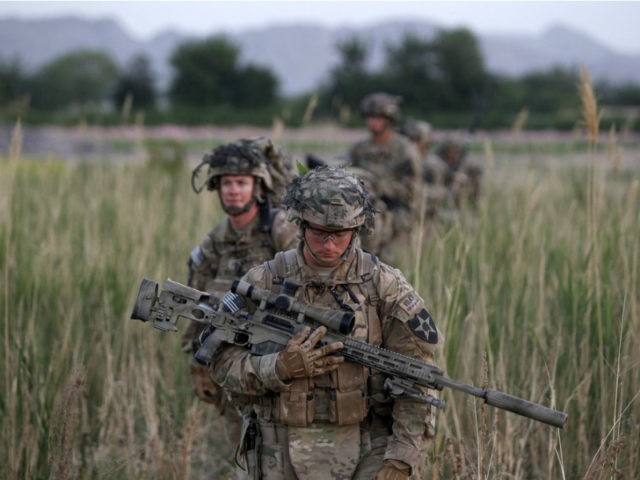A U.S. Green Beret in Afghanistan recently declared that America is “not at war with the Taliban,” reflecting the rules of engagement implemented by President Barack Obama, which allow lawyers to dictate when military force is justified, reports The Wall Street Journal (WSJ).
The declaration comes as the Taliban, which was linked to the September 11, 2001, attacks on U.S. soil, is launching an increasingly violent insurgency. Moreover, the U.S. military acknowledged earlier this year that the relationship between the Taliban and a resurgent al-Qaeda in Afghanistan is “growing stronger.”
Whether operating an armed aircraft or carrying a weapon on the ground, Americans have to get a lawyer’s approval before they can fire, suggests the report.
WSJ explains, “In the amorphous twilight of the Afghan war, it isn’t enough to draw a bead on the enemy. Before they shoot, U.S. troops have to navigate a tricky legal and political question: When is it OK for them to kill Taliban?”
Although U.S. troops and military aircraft are allowed to attack jihadists from al-Qaeda and the local Islamic State branch, the rules of engagement regarding the Taliban are different.
WSJ reports:
Since 2014, American special-operations troops and aircraft have been allowed to strike the Taliban only when the insurgents present a direct threat to U.S. or allied forces, or if the Afghan government faces a catastrophic failure such as loss of a major city.
Troops up and down the chain of command, though, say that in practice the rules are mushy, open to interpretation about what constitutes justifiable violence, particularly when only Afghan soldiers are directly in harm’s way. U.S. commanders and military lawyers make seat-of-the-pants calls every day about using force against the Taliban, trying simultaneously to respect the rules, avoid killing civilians and spare their allies casualties that a quick airstrike might prevent.
When President Obama ended the U.S. combat mission in Afghanistan at the end of 2014, he took away the American military’s authority to offensively attack Taliban jihadists, only allowing them to shoot at the terrorists in self-defense, when they pose an imminent threat.
U.S.-trained Afghan security forces, who have been rated ineffective, assumed the lead of operations against the Taliban at the beginning of 2015.
By the end of that year, Taliban terrorists had replaced their Islamic State (ISIS/ISIL) rivals as the world’s chief perpetrators of terrorist attacks, with 1,093 individual attacks, according to Obama’s own State Department.
Afghan security forces and civilians have suffered a record number of casualties at the hands of the terrorist group.
Nevertheless, WSJ reports, “U.S. is no longer at war with Taliban, so Special Forces remaining in Afghanistan have to weigh every situation to decide whether striking them is justified.”
Echoing requests by his predecessor, Gen. John Nicholson, the top commander of U.S. and NATO forces in Afghanistan, has indicated that he would like Obama to grant him more authority to use air power to assist the Afghan security forces.
“In response, Mr. Obama ruled this month that U.S. troops and aircraft, until now limited to assisting Afghan commandos and other special units, will be allowed to provide the same aid to Afghan conventional forces, who in several places have been reeling from Taliban warm-weather attacks,” notes WSJ.
“Mr. Obama also decided to allow the military a freer hand to use airstrikes to help Afghan forces conducting major offensives,” it adds.”Those expanded powers mean U.S. commanders and their lawyers will have to decide even more frequently whether they can justify the use of force against Taliban fighters.”
In a sworn statement that was part of a heavily redacted Pentagon report that was declassified earlier this year, a battle-hardened Green Beret said the Afghanistan war mission suffers from “moral cowardice” and a “profound lack of strategy.”
“The enemy operates with impunity throughout the country due to our relentless commitment to avoid principled strategy and decision-making processes,” he added.
The U.S. military prohibits Green Berets from releasing their names.
“We’re not at war with the Taliban,” one of the senior U.S. Green Berets in Afghanistan told The Wall Street Journal.
As of the end of February, nearly 13,000 coalition troops were serving in Afghanistan, including about 9,000 from the United States, according to the Pentagon.

COMMENTS
Please let us know if you're having issues with commenting.